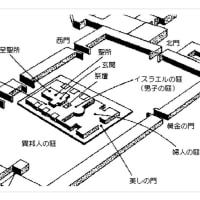マルコの福音書2章 衝突の始まり
1.中風の人の癒し(2:1-12)
イエスは、ナザレからガリラヤへ引っ越しをしました(ルカ4:31)。本格的に宣教を開始しはじめたのです。イエスに対する注目度はすぐにも高まり、当時の宗教家たちとの衝突も徐々に深まっていきます。2章は、それらの事件をまとめて記録するものです。
まず3節、イエスは中風の人の罪を赦しました(1-12節)。中風は、今風に言えば脳卒中、あるいは脳梗塞で後遺症を負った、障害者のことです。四人の友に連れて来られたこの人は、イエスによって罪の赦しの宣言を受けます。そのイエスの行為に宗教家たちが違和感を覚えたのです。確かに罪の赦しは、被害者か、あるいは、これを裁かれる神以外に誰ができるものでしょう。被害者でもないのなら、あなたは神なのか、と言うわけです。
すると、イエスは、自分の行為が、気休めの声掛けでもなく、まことに神の権威によるものであることを示すため、この男の障害を治されるわけです。通常病気は火事、障がいは火事の焼け跡に例えられます。つまり病気は治ることがあっても障がいは治らないものです。しかしイエスは、その不可能なことを可能にしたのです。そして、ご自身が神であることをお示しになりました。そんなこともあるのか?と思われますか?
2.レビの召命(2:13-22)
続いて、アルパヨの子レビ、つまりマタイがイエスの弟子として召されたエピソードが記されます。マタイは、通行税を徴収する税関の仕事をしていました。この時マタイは、ぼんやりと座っていたのかもしれません。そんなマタイの心に、イエスは「わたしについて来なさい」と語り掛けました。当時の収税人は、異邦人と接触することが多かったので、罪人と同様、距離を取るべき汚らわしい存在と見なされていました。そんな取税人の家で食事をするなど、当時の宗教家たちには考えられないことでした。
そうであればこそ、この出来事は、マタイの心を動かし、彼の人生に転機をもたらすものとなったのです。マタイがこの時何を感じたのか、それは、マタイだけが記録するイエスのことば「すべて疲れた人、重荷を負っている人はわたしのもとに来なさい。わたしがあなたがたを休ませてあげます」(マタイ11:28)に良く表れているでしょう。マタイは当時の社会的な差別意識に、不本意な思いを抱いていたことでしょう。
私が、幼い頃、50年以上も前の日本は、今ほどに差別意識に対する繊細さはありませんでした。例えば、親が3Kと呼ばれる仕事をしている人を、平気で馬鹿にする人がいたものです。汚い仕事をする人イコール汚い人みたいな。今の時代にあってはそんな発言は考えられません。むしろ、そういう仕事をしてくれる人がいるからこそ、社会がうまく動いているのだと、滾々とお説教されることでしょう。ともあれ、マタイも、そのように、理不尽な侮辱や罵声を浴びせられる人生に疲れていたのでしょう。あるいは、ローマの手先となって、ごまかしを重ねる仕事にも嫌気がさしていたのかもしれません。
そんなマタイの心に、イエスが語り掛けたわけです。「わたしがあなたを休ませてあげます」と。理不尽で、差別的、侮辱的な世の中とは全く別世界の世界が、イエスと共にありました。マタイの存在を大事に思い、手ぶらで語り合おうとする人の世界がそこにありました。22節「新しいぶどう酒は新しい皮袋に」とあります。新しい人生に生きようとするのなら、新しい人生の主を見出すことです。
3.安息日も主(12:23-28)
最後に、安息日の出来事。旧約聖書の時代と1世紀のイエスの時代は、いささか違うものがあります。イエスの時代には、旧約聖書の時代にはなかった戒めがありました。彼らは旧約聖書の教えを厳格に守るために、その教えが守りやすくするために様々な教えを付け加えたのです。例えば、安息日を守るために、何メートル以上出かけてはいけないとか、かくかくしかじかの仕事をしてはいけない、とか。イエスは、別の箇所でそれらを「先祖の言い伝え」と呼び、批判しています。大切なのは、聖書の教え、しかもその形ではなく、精神をしっかり守ること。そこでイエスは、安息日は人の為に設けられた、安息は楽しむものだと教えるのです。そして神はその安息を楽しむ人を祝されるのです。信仰は規則を実践するようなものとは違います。神のいのちを味わう、これが全てなのです。では今日もよき一日となるように祈ります。
Mark 2: The Beginning of the Conflict
1. healing of the man with the gout (2:1-12)
Jesus moved from Nazareth to Galilee (Luke 4:31). He began to begin missionary work in earnest. Chapter 2 is a summary record of these events.
First, in verse 3, Jesus forgave the sins of a man with the gout (vv. 1-12). The gout, in modern parlance, is a stroke, or a person who is handicapped, having suffered the aftereffects of a stroke. Brought by four friends, this man receives the proclamation of the forgiveness of sins by Jesus. The religious people were uncomfortable with this act of Jesus. Surely who can forgive sins but the victim or the God who judges this? If you are not a victim, they say, are you God?
Jesus then heals the man's disability to show that his action is not a comforting call, but is truly by the authority of God. Usually, illness is likened to a fire, and a disability is likened to the scars of a fire. In other words, a disease can be cured, but a disability cannot. But Jesus made the impossible possible. And He showed that He is God. Is that even possible? Do you think so?
2. the calling of Levi (2:13-22)
Next, the episode is described in which Levi, the son of Arpajo, or Matthew, was called to be a disciple of Jesus. Matthew was working at the customs office collecting tolls. Matthew may have been sitting in a daze at this time. Jesus spoke to Matthew's heart, "Follow me. At that time, tax collectors often came into contact with Gentiles and were regarded as unclean beings who should be kept at a distance, just like sinners. It was unthinkable for the religious people of that time to eat in the house of such a tax collector.
That being the case, this event touched Matthew's heart and brought about a turning point in his life. What Matthew felt at this time was what Jesus' words, recorded only by Matthew, "Come to me, all you who are weary and heavy laden, and I will give you rest. I will give you rest" (Matthew 11:28). Matthew must have been unwilling to accept the social discrimination of his day.
When I was a child, more than 50 years ago, Japan was not as sensitive to discrimination as it is today. For example, there were people who made fun of people whose parents worked in what they called "3K" jobs. Like a person who does dirty work equals a dirty person. In this day and age, such a statement is unthinkable. Rather, they would be preaching to us in copious amounts that it is because there are people who do that kind of work that society is running well. Anyway, Matthew must have been tired of such a life of unreasonable insults and abuse. Or perhaps he was tired of working as an agent of Rome, and of having to do all the deceptive things that were done to him.
Jesus spoke to Matthew's heart. I will give you rest. With Jesus, there was a world completely different from the unreasonable, discriminatory, and insulting world. There was a world of people who cared about Matthew's presence and were willing to talk with him empty-handed. v. 22 "New wine is in new leather bags. If you are going to live a new life, you must find the Lord of your new life.
3. the Lord also on the Sabbath (12:23-28)
Finally, there is the Sabbath. There is something somewhat different between the Old Testament times and the time of Jesus in the first century. In Jesus' time, there were commandments that did not exist in Old Testament times. They strictly observed the teachings of the Old Testament, but they added various teachings to make those teachings easier to observe. For example, they were not allowed to go out more than a few meters to observe the Sabbath, or not to do any work on the Sabbath day. In another passage, Jesus criticizes them, calling them "the lore of our fathers. What is important is to firmly adhere to the teachings of the Bible, and not its form, but its spirit. So Jesus teaches that the Sabbath was established for man, and that rest is to be enjoyed. And God celebrates those who enjoy that rest. Faith is not like practicing a set of rules. It is all about tasting the life of God. I wish you a good day today.
















